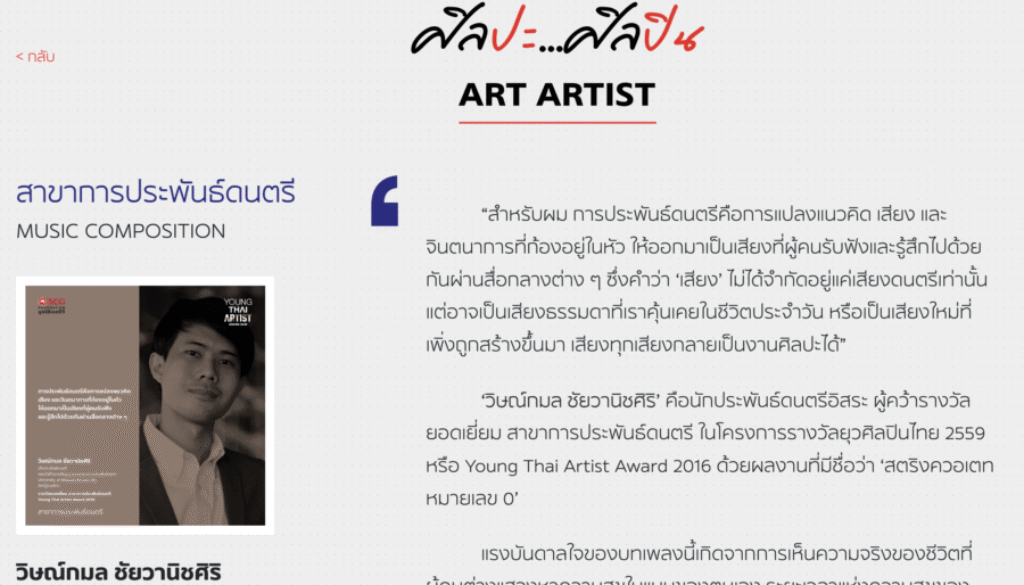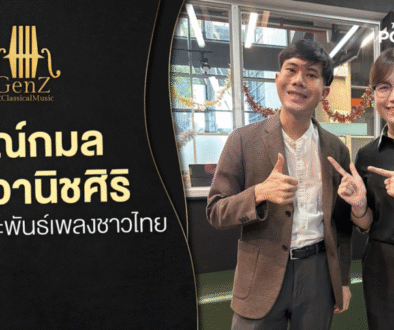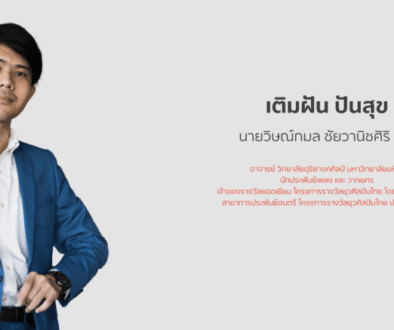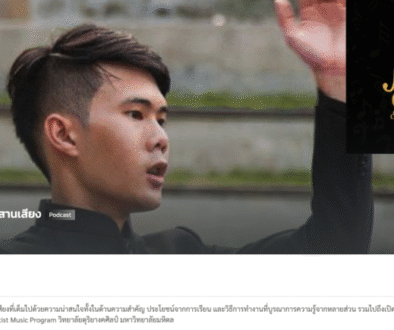SCG Foundation – ศิลปะ ศิลปิน
เผยแพร่ ณ เว็บไซต์มูลนิธิเอสซีจี วันที่ 1 กรกฎาคม 2568
https://www.youngthaiartistaward.com/idol/49/music/
“สำหรับผม การประพันธ์ดนตรีคือการแปลงแนวคิด เสียง และจินตนาการที่ก้องอยู่ในหัว ให้ออกมาเป็นเสียงที่ผู้คนรับฟังและรู้สึกไปด้วยกันผ่านสื่อกลางต่าง ๆ ซึ่งคำว่า ‘เสียง’ ไม่ได้จำกัดอยู่แค่เสียงดนตรีเท่านั้น แต่อาจเป็นเสียงธรรมดาที่เราคุ้นเคยในชีวิตประจำวัน หรือเป็นเสียงใหม่ที่เพิ่งถูกสร้างขึ้นมา เสียงทุกเสียงกลายเป็นงานศิลปะได้”
‘วิษณ์กมล ชัยวานิชศิริ’ คือนักประพันธ์ดนตรีอิสระ ผู้คว้ารางวัลยอดเยี่ยม สาขาการประพันธ์ดนตรี ในโครงการรางวัลยุวศิลปินไทย 2559 หรือ Young Thai Artist Award 2016 ด้วยผลงานที่มีชื่อว่า ‘สตริงควอเตท หมายเลข 0’
แรงบันดาลใจของบทเพลงนี้เกิดจากการเห็นความจริงของชีวิตที่ผู้คนต่างแสวงหาความสุขในแบบของตนเอง ระยะเวลาแห่งความสุขของแต่ละคนจึงไม่เคยเท่ากัน บางครั้งอาจเกิดขึ้นเพียงชั่วครู่ ขณะที่บางครั้งอาจยาวนาน เมื่อช่วงเวลาแห่งความสุขผ่านพ้นไป ความทุกข์และความวุ่นวายในใจก็มักจะย้อนกลับมาเสมอ ผมจึงอยากถ่ายทอดความเคลื่อนไหวระหว่างสุขกับทุกข์ ระหว่างความสงบกับความวุ่นวาย ผ่านเสียงดนตรีโดยใช้วงสตริงควอเตท หรือวงเครื่องสายสี่ชิ้น เป็นตัวเล่าเรื่อง”
ก่อนจะเดินทางมาถึงความสำเร็จ เขาหมั่นฝึกฝนและพัฒนาทักษะทางดนตรี ผ่านการเรียนรู้และเข้าใจตนเอง
วิษณ์กมลเติบโตมาในครอบครัวที่แวดล้อมไปด้วยเสียงดนตรี คุณพ่อเล่นไวโอลิน ขณะที่พี่สาวทั้งสองคนชื่นชอบการร้องเพลง ส่วนวิษณ์กมลแม้จะร้องเพลงไม่ถนัด แต่ครอบครัวก็สนับสนุนให้เขาเรียนเปียโน ในช่วงแรก เขายังไม่ได้รู้สึกผูกพันกับเครื่องดนตรีชนิดนี้มากนัก การเรียนเปียโนจึงเป็นเพียงกิจกรรมหนึ่งที่อยู่ในตารางชีวิต
กระทั่งเมื่อเข้าสู่ช่วงมัธยม เขาได้ชมภาพยนตร์เรื่อง Secret กำกับและแสดงโดย เจย์ โจว ซึ่งมีเปียโนเป็นหัวใจของเรื่อง และถ่ายทอดเรื่องราวผ่านแนวคิดการย้อนเวลาได้อย่างทรงพลัง ภาพยนตร์เรื่องนั้นได้เปลี่ยนวิธีที่เขามองดนตรีไปโดยสิ้นเชิง และเป็นจุดเริ่มต้นที่ทำให้เขาเริ่มรู้สึกเพลิดเพลินกับการเล่นดนตรี
จุดเปลี่ยนสำคัญเกิดขึ้นเมื่อวงโยธวาทิตของโรงเรียนต้องการผู้เล่นเปียโนเพื่อใช้ในการแข่งขัน วิษณ์กมลจึงได้รับเลือกให้ร่วมแสดง
“หลังจบการแข่งขัน ผมรู้สึกสนุกและผูกพันกับประสบการณ์ครั้งนั้น จึงตัดสินใจอยู่ต่อกับวงโยธวาทิตของโรงเรียนอุดมศึกษา ระหว่างนั้นก็ได้ลองฝึกทำเพลง และเริ่มต้นเรียนรู้การเล่นเครื่องเป่าอย่างจริงจัง เครื่องดนตรีที่ผมเล่นช่วงมัธยมคือ แซ็กโซโฟน (Saxophone) โดยมีอาจารย์ พัลลภ จีบสุวรรณ และอาจารย์ บัณฑิต ชื่นไม่วาย เป็นผู้ควบคุมวง”
เมื่อจบการศึกษาระดับมัธยมปลาย เขาตัดสินใจเดินหน้าต่อในเส้นทางดนตรีอย่างจริงจัง โดยเลือกศึกษาต่อในสาขาการประพันธ์ดนตรี ณ วิทยาลัยดุริยางคศิลป์ มหาวิทยาลัยมหิดล โดยมีอาจารย์เอกการประพันธ์เพลงคือ อาจารย์ Valeriy Rizayev และ อาจารย์ด้านการอำนวยเพลง คือ ดร. ภมรพรรณ โกมลภมร
“ก่อนจะมาสนใจดนตรี ผมเป็นเด็กเนิร์ดคนหนึ่งที่ชอบเขียนโปรแกรม ทำเว็บไซต์ ตัดต่อหนัง และออกแบบกราฟิก จนกระทั่งได้ลองใช้โปรแกรมสำหรับแต่งเพลงและเขียนบันทึกโน้ต นั่นทำให้ผมเริ่มแต่งเพลงง่าย ๆ ในแบบของตัวเอง ตอนสอบเข้ามหาวิทยาลัย ผมลองสอบหลายที่ ทั้งในด้านการเล่นเครื่องดนตรีและการประพันธ์เพลง สุดท้ายสอบติดสาขาการประพันธ์ดนตรี จึงตัดสินใจเลือกเรียนที่นี่”
ต่อมาวิษณ์กมลเริ่มให้ความสนใจในด้านดนตรีศึกษา จึงยื่นสมัครศึกษาต่อที่ประเทศสหรัฐอเมริกา แม้จะสอบผ่านและได้รับเชิญให้เข้าสัมภาษณ์ แต่ผลลัพธ์กลับไม่เป็นไปตามที่คาดหวัง เขาจึงใช้เวลาหนึ่งปีเพื่อเตรียมความพร้อมและเก็บเกี่ยวประสบการณ์เพิ่มเติม
“ช่วงนั้นผมทำโปรเจ็กต์ร่วมกับเพื่อน ๆ ในนาม ‘กลุ่มดนตรีศึกษา Musica per Tutti (Music for All)’ เราเดินทางไปตามโรงเรียนต่าง ๆ เพื่อสาธิตและเล่าเรื่องเกี่ยวกับดนตรี มีทั้งกิจกรรมปฏิสัมพันธ์กับคนดูและการจัดแสดงคอนเสิร์ต ซึ่งได้รับการสนับสนุนอย่างดีจากมูลนิธิเอสซีจี นั่นทำให้ผมเริ่มมองเห็นว่าสิ่งที่รวมทุกอย่างที่ผมสนใจในดนตรีไว้ด้วยกันคือ การอำนวยเพลง เพราะเป็นการทำงานกับผู้คน การสื่อสาร และสอนดนตรีในอีกรูปแบบหนึ่ง
“ในอีกแง่ก็คล้ายกับการประพันธ์เพลง เพราะเราต้องเข้าใจโครงสร้างดนตรีทั้งหมด ถึงจะถ่ายทอดออกมาได้ถูกต้อง ช่วงนั้นผมยังแต่งเพลงควบคู่ไปด้วย ทำทั้งสามอย่างวนไปมา จนสุดท้ายก็รู้ตัวว่าสิ่งที่อยากต่อยอดและยังรู้ไม่พอคือการอำนวยเพลง จึงตัดสินใจเรียนต่อปริญญาโทด้านนี้ที่มหาวิทยาลัยมหิดล”
เขากล่าวว่า ระหว่างการเรียนปริญญาโท ได้รับโอกาสจาก ผศ.ดร.ธนพล เศตะพราหมณ์ในการทำกิจกรรมต่าง ๆ และ ได้รับโอกาสจากวิทยาลัยดุริยางคศิลป์ มหาวิทยาลัยมหิดล ในการทำงานต่อหลังจบปริญญาโท ในตำแหน่งผู้ประสานงานโรงเรียนความร่วมมือ และอาจารย์สอนวิชาที่เกี่ยวข้องกับทฤษฎีดนตรี และเนื่องจากเรียนด้านการอำนวยเพลง จึงได้ดูแลวงขับร้องประสานเสียงตั้งแต่ระดับมัธยมปลาย จนถึงระดับปริญญาตรีด้วย
“ช่วงปริญญาตรีผมเรียนการแต่งดนตรีแบบร่วมสมัย (Contemporary Music) พอใกล้จบปริญญาโท จึงให้ความสนใจกับการประพันธ์เพลงสำหรับวงดุริยางค์เครื่องลมที่หล่อหลอมเรามา ก็เลยลองแต่งเพลงมาร์ชชื่อ มาร์ชเจ้าพระยา แล้วบังเอิญว่ามีวงนำไปเล่นจนเป็นกระแส ทำให้มีคนติดต่อมาให้แต่งเพลงมากขึ้นจนกลายเป็นอาชีพได้ ผมแต่งเพลงจนรู้สึกคุ้นมือ คิดว่าถึงเวลาต่อยอดแล้ว จึงตัดสินใจไปเรียนต่อปริญญาเอกด้านการประพันธ์เพลงที่ University of Missouri-Kansas City สหรัฐอเมริกา”
ปัจจุบัน แม้เขาจะกำลังศึกษาต่อ แต่ก็มีโปรเจ็กต์สำหรับนักประพันธ์เพลงวงดุริยางค์เครื่องลมไทยชื่อ Thai Wind Composers (thaiwindcomposers.com) ที่ทำร่วมกับนักประพันธ์ชาวไทยหลายท่าน เพื่อเป็นแหล่งรวมข้อมูลบทเพลงงานประพันธ์ไทย และ จัดกิจกรรมเพื่อเชื่อมโยงทุกภาคส่วนที่เกี่ยวข้องกับดนตรีเข้าด้วยกัน ตัวอย่างโครงการเช่น การทำงานร่วมกับวงดุริยางค์เครื่องลมเยาวชนเชียงราย เพื่อสร้างนักแต่งเพลงรุ่นใหม่ โดยเขาเชื่อว่า หากเยาวชนทั่วประเทศมีพื้นที่เช่นนี้ เสียงของชุมชนจะดังก้องและได้รับการรับฟังอย่างแท้จริง
นอกจากนี้ วิษณ์กมลยังมีวิธีการทำงานที่น่าสนใจ เขาแต่งเพลงเป็นกิจวัตร และให้ความสำคัญกับการวางแผนเป็นหลัก โดยมักเริ่มจากการวางโครงสร้างของบทเพลงตั้งแต่ต้นจนจบอย่างชัดเจน ซึ่งแนวทางนี้เองที่ทำให้เขาได้รับคำชมจากผลงาน ‘สตริงควอเตท หมายเลข 0’ ว่าเป็นบทเพลงที่มีโครงสร้างชัดเจน มีจังหวะการเล่าเรื่องที่ดี ราวกับวรรณกรรมที่เรียบเรียงอย่างมีชั้นเชิง
“อีกหนึ่งคำแนะนำถึงเยาวชนที่ฝันอยากเป็นนักแต่งเพลง คือจงเริ่มลงมือทำ เปิดรับงานศิลปะที่หลากหลาย และอย่าลืมอ่านหนังสือ เพราะวรรณกรรมคือการเล่าเรื่องด้วยถ้อยคำ ขณะที่ดนตรีคือการเล่าเรื่องด้วยเวลาและเสียง โลกกว้างเหล่านี้คือแหล่งแรงบันดาลใจสำคัญในการสร้างสรรค์ผลงาน” วิษณ์กมลกล่าวก่อนจบบทสนทนา
English Translation
Translated by Google Gemini 2.5 Pro on October 19, 2025
Published on the SCG Foundation Website https://www.youngthaiartistaward.com/idol/49/music/
July 1, 2025
“For me, music composition is the process of transforming the concepts, sounds, and imagination that echo in my head into audible sounds that people can listen to and feel together through various mediums. The word ‘sound’ is not limited to just musical sounds; it can be ordinary sounds we are familiar with in daily life, or new sounds that have just been created. Every sound can become a work of art.”
‘Viskamol Chaiwanichsiri’ is an independent composer who won the Excellence Award in the Music Composition category of the Young Thai Artist Award 2016 for his work titled ‘String Quartet No. 0’.
“The inspiration for this piece came from observing the reality of life where people seek happiness in their own ways. The duration of happiness is never the same for everyone. Sometimes it may last only a moment, while at other times it may be long. When the moment of happiness passes, suffering and turmoil in the mind often return. I wanted to convey the movement between happiness and suffering, between tranquility and turmoil, through music, using a string quartet, or a four-piece string ensemble, as the storyteller.”
Before arriving at this success, he diligently practiced and developed his musical skills through learning and self-understanding.
Viskamol grew up in a family surrounded by the sound of music. His father played the violin, while his two older sisters loved to sing. Although Viskamol wasn’t a skilled singer, his family encouraged him to learn the piano. Initially, he didn’t feel a strong connection to the instrument; piano lessons were just another activity on his schedule.
It wasn’t until he was in secondary school that he watched the film Secret, directed by and starring Jay Chou, in which the piano is the heart of the story, powerfully conveying a narrative through the concept of time travel. That film completely changed the way he viewed music and was the starting point that made him begin to enjoy playing.
A significant turning point occurred when his school’s wind band needed a piano player for a competition. Viskamol was chosen to perform with them.
“After the competition ended, I had fun and felt a connection to that experience, so I decided to stay with the Udomsuksa School’s wind band. During that time, I also tried my hand at arranging music and began seriously learning to play wind instruments. The instrument I played in secondary school was the saxophone, with Mr. Phallop Cheepsuwan and Mr. Bandit Chuenmaiwai as the band directors.”
Upon graduating from secondary school, he decided to move forward seriously on the path of music, choosing to study Composition at the College of Music, Mahidol University. His composition professor was Valeriy Rizayev, and his conducting professor was Dr. Pamornpan Komolpamorn.
“Before getting into music, I was a nerd who loved programming, making websites, editing films, and graphic design. It was when I tried using software for composing and writing notation that I started creating simple songs in my own style. When I applied for university, I auditioned at many places for both performance and composition. I ultimately got into the composition program, so I decided to study here.”
Later, Viskamol became interested in music education and applied to study in the United States. Although he passed the initial screening and was invited for an interview, the outcome was not what he had hoped for. He then spent a year preparing and gaining more experience.
“During that period, I worked on a project with friends under the name ‘Musica per Tutti (Music for All)’. We traveled to different schools to demonstrate and talk about music, with interactive activities for the audience and concerts, which received great support from the SCG Foundation. This made me realize that the one thing that combines all my interests in music is conducting, as it involves working with people, communication, and is another form of teaching music.”
“In another sense, it’s similar to composition because you have to understand the entire musical structure to convey it correctly. I was also composing alongside these activities, doing all three things in rotation. I eventually realized that what I wanted to develop further and still didn’t know enough about was conducting, so I decided to pursue a master’s degree in this field at Mahidol University.”
He mentioned that during his master’s studies, he was given opportunities by Asst. Prof. Dr. Thanapol Setabramana to participate in various activities. After graduating, he was offered a position at the College of Music, Mahidol University, as a Cooperative School Coordinator and a lecturer for courses related to music theory. As he had studied conducting, he also oversaw choral ensembles from the high school to undergraduate levels.
“During my bachelor’s, I studied contemporary music. As I neared the end of my master’s, I became interested in composing for the wind ensemble, which had shaped me. So, I tried writing a march called the Chao Phraya March. Coincidentally, a band performed it and it went viral, leading to more people contacting me to write music until it became a profession. I composed until I felt comfortable and thought it was time to build on it, so I decided to pursue a doctorate in composition at the University of Missouri-Kansas City in the United States.”
Currently, while he is studying, he also runs a project for Thai wind ensemble composers called Thai Wind Composers (thaiwindcomposers.com) in collaboration with several other Thai composers. The project aims to be a resource hub for Thai compositions and to organize activities that connect all sectors related to music. An example is a project working with the Chiang Rai Youth Wind Ensemble to develop a new generation of composers. He believes that if young people across the country have such platforms, the voices of their communities will resonate and be truly heard.
Furthermore, Viskamol has an interesting work method. He composes as a daily routine and prioritizes planning, often starting by laying out a clear structure for the piece from beginning to end. It was this approach that earned his work ‘String Quartet No. 0’ praise for being a piece with a clear structure and a well-paced narrative, much like a masterfully arranged piece of literature.
“Another piece of advice for young people who dream of becoming composers is to just start doing it. Be open to a wide variety of art forms, and don’t forget to read books. Literature is storytelling with words, while music is storytelling with time and sound. These vast worlds are crucial sources of inspiration for creating work,” Viskamol said at the end of the conversation.



